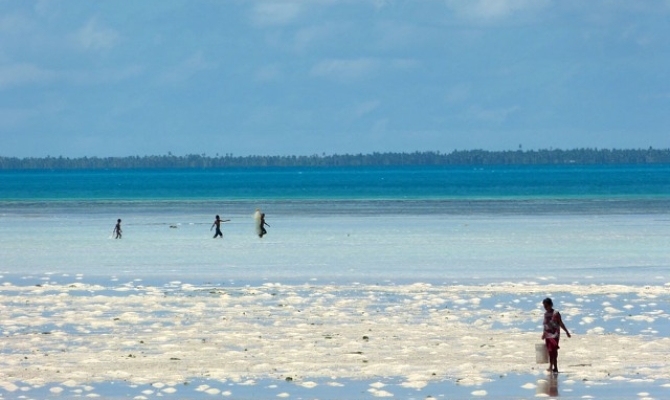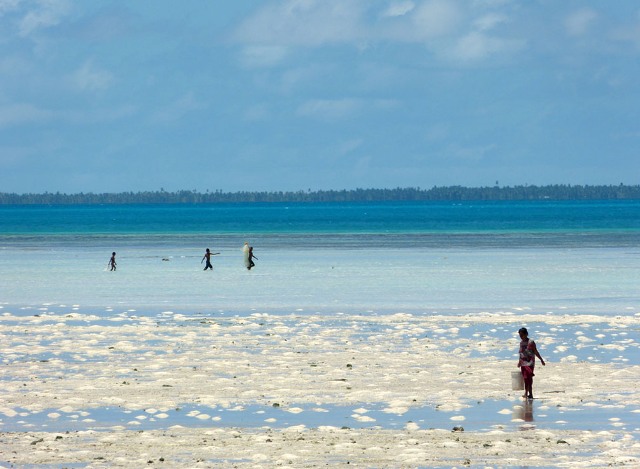
Climate Change Resilience
Kiribati is leading what appears to be a world-first effort to implement a ‘whole-of-island’ approach to climate change adaptation and disaster risk management in a coral atoll nation.
The island of Abaiang, north of the capital island of Tarawa, was identified by the Government of Kiribati as a pilot site where community resilience to climate change and natural hazards will be addressed in an integrated fashion across all sectors of social and economic life.
The integrated approach is designed to more comprehensively support people and the environment on which they depend for sustenance and livelihoods. It promotes better coordination between community, local and national government and donor-funded projects.
 Abiang, Kiribati - fishing and collection of reef species. Photo by Carlo Iaccovino
Abiang, Kiribati - fishing and collection of reef species. Photo by Carlo Iaccovino
 Abiang, Kiribati - fishing and collection of reef species. Photo by Carlo Iaccovino
Abiang, Kiribati - fishing and collection of reef species. Photo by Carlo IaccovinoRepresentatives from the Office of the Beretitenti (President) and the new Kiribati National Expert Group on Climate Change and Disaster Risk Management recently travelled to Abaiang to conduct ‘integrated vulnerability assessments’ in 18 communities and all of the island’s schools and health centres. They were supported by specialist staff from the Secretariat of the Pacific Community (SPC), Deutsche Gesellschaft für Internationale Zusammenarbeit (GIZ) and the Secretariat of the Pacific Regional Environment Programme (SPREP). The assessments are a tool to measure capacity to respond to disasters and climate change by analysing strengths and weaknesses in social structures and local environmental processes.
The combined team discussed issues affecting the local population says Tuake Teena, Senior Fisheries Officer with the Ministry of Fisheries and Marine Resource Development. ‘We learned that there are quite a lot of issues there, in particular a decline in fisheries production. The people told us that many mangroves and seagrass beds have been lost and coral reefs destroyed.’
They also discussed adaptations that community members proposed to support environmental systems to better cope with climate change. ‘One of the villages proposed they need to setup a marine protected area. On the government side, we would fully support this kind of idea, because it would enhance the fisheries production, especially in the lagoon.’
The joint mission by government and supporting agencies was endorsed by the nation’s cabinet in August 2013 and conducted over a period of weeks in September. The mission is currently on-going in Kiribati and includes an awareness programme.
Following community consultations, the focus has shifted to analysing the data collected and planning integrated responses across multiple sectors, including water, fisheries, agriculture, education, health, and governance. The implementation of these responses will be supported through partnerships between multiple government departments, inter-governmental organisations and development partners.
Within the integrated approach, SPREP and the Kiribati Ministry of Public Works and Utilities, with project funding from USAID, are aiming to improve water resources capacity in Abaiang. The project will enable communities on the atoll to manage their water supply and better understand the vulnerabilities they are facing from climate change and non-climate related risks.